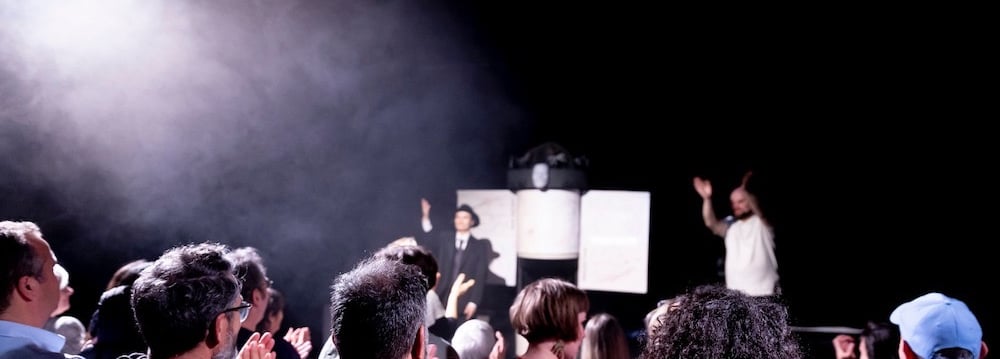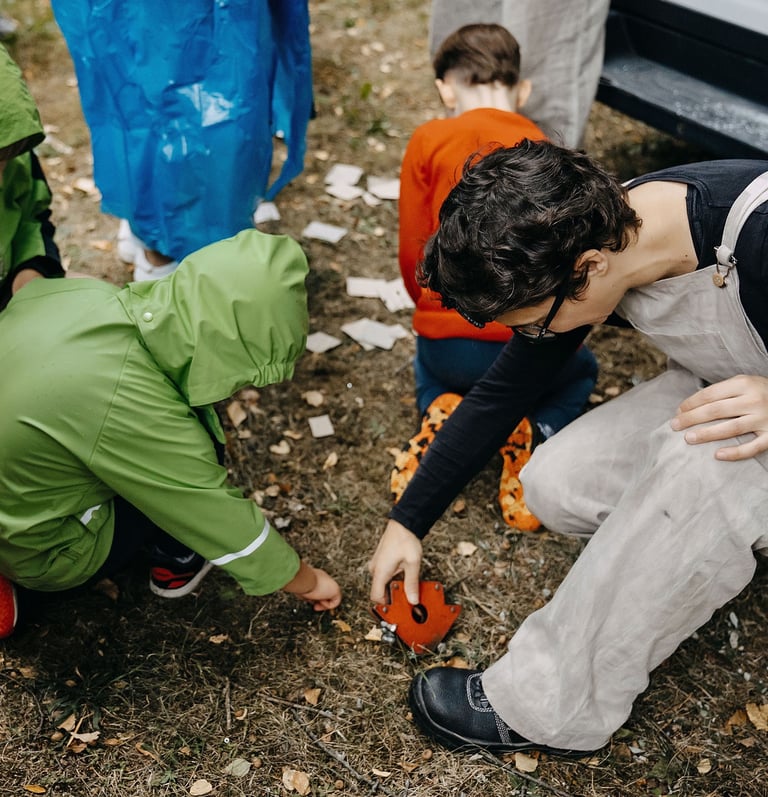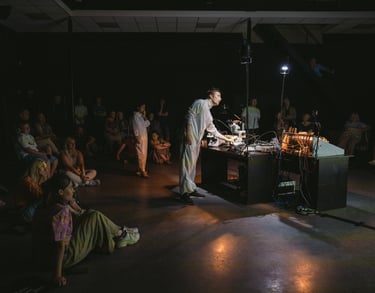Notes on sustainable touring for visual theatre and puppetry


Preface
People have the Power - Puppets have the power
foreword text by Luís Vieira & Rute Ribeiro
The world is changing at a breakneck and wild pace. This constant change in a world profoundly affected by climate change, technology and political thinking is forcing organisations and our behaviours to try to keep up with or to adapt to these mutations. What about the artists? What role can they play? And their organisations? They must be attentive and to raise awareness of these changes - thinking about the present and projecting the future.
The word curiosity occupies an important place in our journey, both as creators and as programmers of an international festival. The desire for knowledge, for information, for learning, combined with the artistic choice of working around puppetry, an ancient art that has managed to adapt to the constant changes in the world.
Our interest and vision towards puppetry as creatives, lies in its own nature, its theatrical specificity and special plurality. For us, puppetry is the art of movement and the art of artistic freedom. The art that combines several arts and makes us dream and think that everything is possible, the art where it is forbidden to forbid. It is a theatre that uses objects, puppets, masks, shadows... This visual and plastic theatre allows us to move from a microcosm to a macrocosm in a flash, to play with gravity and with scale changes. A theatre full of images and material forms in movement.
Puppetry is more and more present in contemporary creation, proving to be an exceptional ‘tool’ for artistic transversality. Its presence and influence in the creations of numerous artists is notorious, establishing bridges with dance, theatre, visual arts, cinema and the new technologies. The contemporary puppet theatre has been characterised by new dramaturgies associated with all types of puppets, but also with the manipulation of materials, objects and images. The puppet has the power to seriously and creatively address all subjects, even the most sensitive ones, and increasingly symbolises our time, invaded by images and objects. Within our festival’s programme we have attempted to create a showcase of that multiplicity, present in the world of puppetry.
Artists live off the idea of travelling, they live off audiences, and for that they need to travel, to meet other artists, to show their work and discoveries, to meet new people and new ideas, they need to find their ‘fuel’. On the other hand, our organisations are obliged to think about what is happening in the world and be on the lookout for new possibilities. That's why it's increasingly challenging to programme meetings between artists and audiences and to organise festivals, which are a source of great artistic inspiration, as well as engines of development and discovery, in addition to providing moments of sharing, knowledge, communion and celebration.
The FIMFA Lx - Festival Internacional de Marionetas e Formas Animadas - International Festival of Puppets and Animated Forms celebrates its 25th anniversary in 2025, and has kept pace with these changes. We try to create conditions so that companies can present their work more often, and sometimes we work with other territorial partnerships, broadening our audiences. We promote transmission and talks with the audience and with artists and their works. As creators, we favour natural or biodegradable materials, and we encourage recycling. We promote the presentation of performances with relevant topics that challenge our society, that speak of identity, freedom, memory, environment, but also of what threatens us, following our motto: the puppet as a means of seeing and thinking the world with another gaze.
The puppeteer is guided by the curiosity, by the freedom to invent worlds, to discover new ideas, new ways of thinking and challenging, new materials and new ways of communicating, and this spirit must underpin the new structuring practices of organisations, promoting behaviours and ways of intervening that take into account the contemporary society and promote a sustainable world.
It's clearly in our hands: People have the Power, as Patty Smith's song says. From this perspective, and as far as we are concerned, we are committed to promoting more sustainable practices in our activities, encouraging the definitive abandonment of the use of more polluting materials in our workshops and rethinking the way artists show and promote their work, in order to reduce our ecological footprint. The puppet has this power to seduce audiences, to reimagine new possibilities and to be an important driving force in changing behaviours, due to its ability to reinvent itself and its relationship with the world.
Puppets have the power - Artists have the power - Taking an inanimate figure or object and giving it the illusion of life is a superpower that can be a valuable agent of change in the world.
1 Exploring sustainable touring via IMPULSE! – New Focus on Puppetry and Visual theatre
– Building Lasting Partnerships and Sustainable Practices Across Europe
IMPULSE! was a joint project by Aura of Puppets (FIN), Kosmos Theatre (LT) and A Tarumba (PT) that ran from 2023–24. The project developed the field of European contemporary puppetry and visual theatre by researching and implementing sustainable touring practices, broadening networks, and enhancing professional development for artists and producers. At the core of the IMPULSE! project was support to the creation and circulation of puppetry works and artists. The project investigated concrete touring network structures through a Touring Pilot Programme, enhanced professional expertise with Master Classes, and broadened the dialogue on sustainability in puppetry through Professional Seminars.
IMPULSE! was initially created to address issues relevant to all partners. Each partner operates on the periphery of Europe, far from the main puppetry markets in Central Europe. The project sought to explore how to move closer to the center, create pathways, broaden networks, and foster growth while maintaining sustainability – both ecological and social. A significant amount of focus was dedicated to evaluating and recalibrating our organizational structures. It felt essential to thoroughly assess our immediate surroundings, identify and address readily actionable issues, and to start building a sustainable foundation for the future.
In addition to reducing emissions by minimizing air travel and material costs, we focused on ensuring fair salaries and providing artists with ample rest and recovery during tours. We aimed to expand our handprint – broadening our reach while on tour – and develop strategies for creating long-term connections. We also sought to offer artists opportunities to develop new professional skills and expand their networks.
We asked whether small organisations can create a big impact. By evaluating our own operations and connections with other players and partners, we discovered many opportunities to influence outcomes beyond our core activities. Our goal was to build a foundation that is both ecologically and socially sustainable, embedding these values throughout our operations. Finally, it was essential to establish a long-term commitment to continuous improvement, requiring us to critically evaluate our actions and remain willing to adapt.
Supporting Artists and Promoting Sustainability
The Touring Pilot Programme included seven different puppetry and visual theatre pieces, which were presented at partner festivals during the project, providing artists with little or no international experience the opportunity to perform and expand their reach abroad. Emphasis was placed on ensuring artists had ample opportunities for rest and recovery, while also guaranteeing fair salaries for all professionals involved. Additionally, three Master Classes were organized for the participating artists, enabling them to combine touring with learning new skills and expanding their professional networks.
Artists had the chance to develop their skills through Master Classes in Micro Cinema, Motion Capture techniques, and Devising and Object Theatre. The project also hosted seminars on a range of important topics, including sustainable touring practices, strategies for building connections and expanding impact while on tour, perspectives on sustainability in performing arts festivals, and Ecodesign & ecological puppet theatre practices.
Impact
The project provided new international opportunities and increased visibility for 32 artists with little or no prior experience performing abroad. Remarkably, the project even facilitated the world premiere of a new work. Both organizers and artists noted that the Touring Pilot Programme and international exchanges helped them reach previously untapped audiences. Beyond creating further work and job opportunities for some participants, the Touring Pilot Programme also influenced how artists spent their time abroad. Nearly all the artists emphasized that the additional time allowed them to form deeper connections with fellow artists and engage more meaningfully with local cultures. They also expressed satisfaction with the chance to travel at a slower pace, appreciating the added flexibility and lower carbon emissions.
As organizations, we have expanded our networks and engaged in discussions about new projects with partners. Additionally, we’ve gained new tools for assessing and reducing our environmental impact, developed strategies for driving change, and strengthened our commitment to sustainability.


Experiences from the touring pilot programme
At the core of the IMPULSE! -project was circulating European works via the touring pilot programme. Artists participating in the performing visits (at least two shows at each festival) also took part in masterclasses and simply had a longer time period to stay in the city where the festival happened. The longer stays directly influence the work and rest balance especially when travelling long distances for a gig. This encouraged the artists to see more shows and discover local scenes as well as meet international colleagues.
After each visit to the partner’s festivals we conducted a small interview with each working group. The interviews were published on the project website impulse.com and provided important information about the touring pilot programme. According to these interviews, many of the participating artists found the visits fruitful and different compared to previous touring experiences in terms of organisation and time of stay.


Testimonials from the artists


“We met many inspiring artists while we participated in one of the master classes organised by the festival. We already agreed to meet with some of them in the upcoming Charleville-Mézières festival.”
– Elina Sarno Fimfa festival 2023
“This was the first international gig with the performance. This was very important for us as a group, luckily Impulse-program made it possible for all of us to join in this gig and that was very special and meaningful. This was also the first time I produced a gig and Valtteri was his first time as a technical manager. We and the whole group learned a lot.”
– Aati Hanikka
ConTempo Festival 2024
“Chamber space, set design and a small creative team are the biggest differences and a great new experience.
I really liked it.”
– Airida Gintautaitė
Fimfa festival 2024
The partnering festivals Contempo, Fimfa Lx and Turku International festival gathered praise from the artists as places of exchange and professional approach to visual theatre performances.
“We felt this Festival was made by and within a community and this is particularly important in these times of individualism and competition.”
Fernando Mota on TIP-Fest 2024
“Everything was very well organized and I feel that we had all the resources we needed. It was the first time we travelled abroad with this show and I have a feeling we could make it again.” Elina Sarno on Fimfa 2023
“The context of the festival itself, the care of the organisers and the other colleagues at the festival were very warm and supportive, and we received a lot of support and positive feedback from the audience.
In fact, after TIP-Fest, we even received several preliminary invitations to perform at other festivals.” – Zilvinas Vingelis on TIP-Fest 2023
“The festival staff was very helpful and communication with the technical team was straightforward and clear. What comes to perspective, I’d say that the festival made it clear that international touring can be joyful and sustainable when preparations are done well, resources are sufficient and they are utilized smartly.” Valtteri Alanen on ConTempo 2024
Many of the artists also experienced the festivals as welcoming spaces and since there was a big emphasis on each partner hosting the working groups at their country’s festival, the result was often a feeling of inclusion not only to the festival programme but to the event as a whole. For the working groups the festival visits were also an opportunity to showcase their work to other international presenters and audiences.
The positive feedback from the artists also included some suggestions on how to develop the touring pilot even further. A longer residency period for creative work was the most attractive idea for the artists:
“Although we all toured internationally with other projects and companies, this is the beginning of touring with the performances of this cycle of creations dedicated to natural spaces and materials, so it was a great place to start. Next time I'd really love to do a creative residency and build all the instruments and objects from local natural materials.”
Fernando Mota
The residency period of one week at the festival was very well received by all the artists since it enabled the working group to get to know the city they visited, see more of the festival as well as to be able to connect with other artists.
“New inspiring performances can be seen at festivals. So I am very much looking forward to them, and I would just add that it’s necessary to give the team as many days as possible on tour so that they could meet with foreign colleagues, see their artistic works.” Airida Gintautaitė
“Local puppet Theatre was amazing to see. Especially in the tour important for me was a possibility to perceive the cultural history of the city, Leliu Teatras founders and their ideas” Iiris Syrjä
“The residency period was super inspiring. I am so happy we had this opportunity to take our piece to Lisbon and to the wonderful FIMFA festival. We were met with the best staff and audience. As a performer this was really an amazing opportunity and I'm very thankful for it.” Niina Lindroos


Tools and projects on sustainable touring
During the IMPULSE! -project we gathered some useful websites and toolkits around the thematic of sustainable touring. Below we share some of our favourite resources.
Toolkits
The Nordic Alliance of Artists’ Residencies on Climate Action (NAARCA) toolkits: https://naarca.art/category/toolkits/
Julie’s Bicycle is a leading not-for-profit, mobilising the arts and culture to take action on the climate, nature and justice crisis. They have a wealth of resources on their website and they actively hold training and seminars.
https://juliesbicycle.com/resources/
Green Toolkit Film and TV is a free access platform that gathers practical guidance and shares sustainability practices and tools implemented across Europe for Film and Audiovisual production.
https://www.greentoolkit-filmtv.eu
Sustainability Lab looks at how we, the performing arts sector, can improve the environmental sustainability of our touring. Their toolkit is very handy in planning the tour.
https://www.sustainability-lab.eu/
Other interesting projects and initiatives
COAL designs and produces cultural events to bring this culture of ecology to life and transmit it to a variety of audiences throughout France, thus helping to reduce inequalities in access to culture.
https://projetcoal.org/en/actions/artistic-direction/cultural-action/
European network for contemporary circus and outdoor arts Circostrada’s resource focusing on Touring, Programming, and Funding Big Tops in Europe. https://www.circostrada.org/en/ressources/touring-programming-and-funding-big-tops-europe
An example of decision-making tool for traveling:
https://on-the-move.org/sites/default/files/inline-files/OTM_sustainable-travel-decision-tools.pdf

